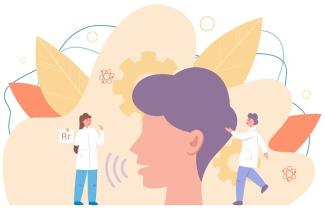The training in speech and language therapy takes place over five years and offers theoretical, practical and interdisciplinary teaching.
The profession of speech therapist
Speech and language therapists are health professionals who offer rehabilitation treatments for speech and language disorders (voice, articulation, comprehension and expression of oral and written language).
The speech therapist makes a diagnosis on medical prescription, then sets up rehabilitation care using technical and playful exercises.
For example, to compensate for pronunciation errors, stuttering, delayed speech acquisition in children, disorders linked to a disability or following a trauma.
Professional perspectives
The profession can be practised on a self-employed or salaried basis in the public and private sectors (hospitals, rehabilitation centres).
Speech and language therapists are health professionals who offer rehabilitation treatments for speech and language disorders (voice, articulation, comprehension and expression of oral and written language).
The speech therapist makes a diagnosis on medical prescription, then sets up rehabilitation care using technical and playful exercises.
For example, to compensate for pronunciation errors, stuttering, delayed speech acquisition in children, disorders linked to a disability or following a trauma.
Professional perspectives
The profession can be practised on a self-employed or salaried basis in the public and private sectors (hospitals, rehabilitation centres).
Les orthophonistes collaborent étroitement avec les médecins, et peuvent collaborer avec d'autres professionnels du secteur paramédical et paramédical (masseur-kinésithérapeutes, orthoptistes, éducateurs spécialisés, ergothérapeutes, psychologues, ect.).
Perspectives professionnelles
La profession peut être exercée à titre libéral, ou salarié dans les secteurs public et privé (hôpitaux, centres de rééducation).
Profil des professionnels
Ce métier exige des qualités telles que :
- de bonnes capacités de communication à l'écrit et à l'oral
- un niveau élevé d'expression et de maîtrise de la langue française
- de bonnes capacités d'analyse, de raisonnement logique et scientifique
- de bonnes qualités d'attention, de patience, d'écoute, d'ouverture d'esprit
How to access?
See the conditions of admission to the course and the registration procedure.
Calendrier universitaire
Training organization
The studies for the Certificate of Competence in Speech and Language Therapy take 5 years (10 semesters):
- 3 years of undergraduate studies (180 ECTS credits), equivalent to Bachelor's level (bac +3)
- 2 years of second cycle (120 ECTS credits), equivalent to the master level (bac +5).
The training represents a total of xx hours of theoretical and methodological instruction, xx hours of applied and practical instruction, and xx hours of personal work.
See the procedures for testing skills and knowledge.
Teaching and internships
The teaching takes into account public health priorities and uses simulation techniques. They enable the acquisition of skills in the following areas in particular:
- language sciences, linguistics
- psychology, educational sciences
- neuroscience, language cognition
- ENT
- pediatrics, geriatrics
See the curriculum.
Students carry out internships leading to ECTS credits, as part of clinical teaching.
At the end of the 5th year, the certificate is issued after validation :
- of all teaching units and internships
- of the final dissertation
- of the certificate of clinical competence.
Teaching and internships
The teaching takes into account public health priorities and uses simulation techniques. They enable the acquisition of skills in the following areas in particular:
- language sciences, linguistics
- psychology, educational sciences
- neuroscience, language cognition
- ENT
- pediatrics, geriatrics
See the curriculum.
Students carry out internships leading to ECTS credits, as part of clinical teaching.
At the end of the 5th year, the certificate is issued after validation :
- of all teaching units and internships
- of the final dissertation
- of the certificate of clinical competence.
Tuition costs
In case of admission to the course, the fees per year of study are :
- Student and campus life contribution (CVEC): 91€
- university registration fees: 539€
Training is also available in continuing education: 5 574€
Sudent intranet
For more information access the student intranet
Sudent intranet
For more information access the student intranet
See also
- Formulaire de demande de diplôme
- Textes réglementant la formation initiale Fédération nationale des orthophonistes
- Syndicat des instituts de formation en ergothérapie français
- Fédération nationale des orthophonistes
- Fédération des orthophonistes de France
- Fédération nationale des étudiants en orthophonie
- Association des étudiants en orthophonie de Marseille
- Code de l'éducation : Section 2 : Les études d'orthophonie (Articles D636-18 à D636-22)

